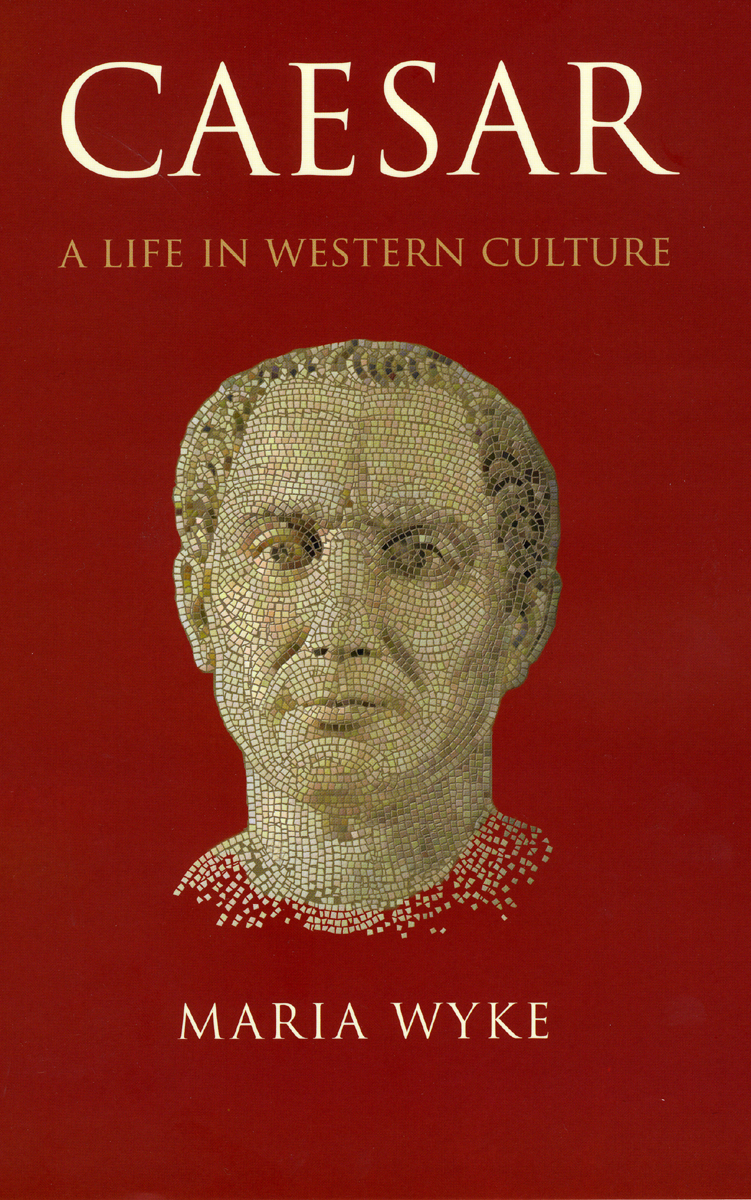A few months ago, my colleague Dallas DeForest reviewed Richard Stoneman's book on the reception from ancient to modern times of the legends surrounding Alexander the Great. Wyke's Caesar is another book of this type (See review). Wyke has no intention of writing a biography of the man whose actions precipitated the collapse of the Roman Republic; there are already hundreds of them in circulation, many of them outstanding.

Instead, Wyke sets out to discuss how people have thought about, invented, and interpreted the various legends that have grown up around the figure of Julius Caesar since his death. Her hope in studying the reception of Julius Caesar in this way, ultimately, is "to expose shifts in the reconstruction, value and use of Julius Caesar and, therefore, to understand the kind of present or future he is asked to encourage or warn against (21)." In that sense Wyke's book is more of an intellectual history of the people who have thought about Caesar than a book about Caesar himself. It is a "metabiography", as she calls it (19).
Wyke has established herself as one of the leading experts on the subject of classical reception. She has written a great deal on reception, covering topics such as the various interpretations both in ancient and modern times of Roman mistresses. She sets out in this book to understand reception of Caesar not through an analysis of the various ways that people have interpreted the great canonical events of Caesar's traditional biography, but rather to focus more sharply on particular aspects of these events, the reception of which has been less thoroughly examined by scholars.
After an introduction in which she sets out her purpose, Wyke divides her work into chapters focusing on the individual episodes of Caesar's life that she has chosen. Chapter 2 discusses the various ways in which Caesar's abduction by pirates has been received since its first appearance in Roman literature soon after his death, all the way through to the 20th century including the use of the story in an episode of Xena: Warrior Princess. The third chapter follows the reception of Caesar's successful campaigns in Gaul (58-51 B.C.), focusing mostly on the way Caesar's outstanding success and cruelty in subduing the Gauls has been interpreted by those living in the region from the Middle Ages until modern times (about which more below). Chapter 4 represents an interesting authorial decision on Wyke's part. She chooses to discuss Caesar's crossing of the Rubicon specifically (49 B.C.), the act which precipitated the civil war that would end the Roman Republic, rather than on Caesar's actions in general during the civil war. The next chapter follows Caesar's time spent in Egypt (48-47 B.C.) with Cleopatra, interpreted variously through time as an exemplar of the height of tyrannical excess, or of chivalric romance. Chapters 6-8 follow the reception of stories about Caesar's time as the first man at Rome, his dictatorship and assassination. The final chapter (9) discusses reception of Caesar's deification, focusing particularly on its interpretation in Christian theology.
Wyke's book is, for the most part, very interesting and will prove useful to scholars of various fields and to the casual reader, interested either in Caesar himself, or in intellectual history generally. Wyke is at her best when she discusses the uses to which Caesar's legend is put in service of various social and political interests from antiquity until the early 20th century.
Most successful is her analysis of the reception of Caesar's time Gaul (41-65). Wyke shows that, depending on context and purpose, Caesar was viewed by the Franks in the Middle Ages either as cruel oppressor of a proud independent Gallic nation, or as the civilizer of a savage people. We learn further that Caesar could be used to great effect by Napoleon and his successors as precedent and exemplar for imperial power. Whereas in the 20th century, Caesar could just as easily become the savage conqueror again, someone to be resisted passionately, while Vercingetorix, the Gallic chieftain who would finally surrender to Caesar in 51 B.C., would become the symbol of the revolutionary spirit in 19th- and 20th-century France.
While Wyke is extremely successful in tracing the various uses of Caesar's legend for political purposes throughout the millennia, the book, I think, is not without its shortcomings. Perhaps it says more about my own biases, but I did not find Wyke's discussion of the alternating gender roles between Caesar and Xena in the television show Xena: Warrior Princess to be particularly interesting or historically enlightening. Further, it hardly seems significant that in the video game Age of Empires 'Ave Caesar' scenario "[t]he player (not the digital avatar) is the source of action…" or insightful (or even true) that, when the player loses the game "they are humorously mocked for failing to live up to the game's version of masculinity…(40)."
The book is well organized, and the use of illustrations was outstanding. Wyke integrated each picture into her narrative, using them to great effect as she developed her various arguments. Further, I disagree with my colleague in his aforementioned review of Stoneman's book on Alexander, in that I found the "metabiographical" format to be very useful for this kind of investigation. A format that would have separate chapters on reception by, say, the Franks, Italians, French, Americans, etc., would become entirely too cumbersome and repetitive. Taken as a whole, this is a lively and well-written study of how a pivotal figure of the classical world lived on for two millennia.
